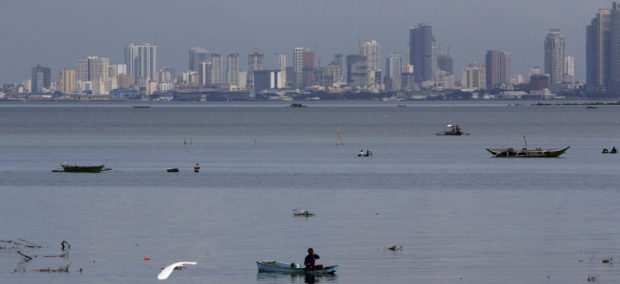Reclamation inevitable in coastal cities like Tokyo, Singapore – Salceda

This file photo shows the Manila skyline as seen across Manila Bay from Cavite. (File photo by RICHARD A. REYES / Philippine Daily Inquirer)
MANILA, Philippines — Reclamation, or the practice of building land over bodies of water, has now become inevitable for coastal cities.
Albay 1st District Rep. Joey Salceda stressed this point in his opening statement before the House Committee on Ways and Means, which he chairs, started its hearing on the Manila Bay reclamation projects that were ordered suspended by President Ferdinand Marcos Jr.
“Reclamation is inevitable when developing large metropolitan cities bound by the sea, and Metro Manila is now the world’s most densely populated megacity. Reclamation is standard practice among the world’s largest and most successful cities: 20 percent of what used to be Tokyo Bay has been reclaimed to accommodate the growing needs of the Tokyo Metropolitan Area,” Salceda said.
“Twenty-two percent of the total land area of Singapore is reclaimed, with around one-third being devoted to the city-state’s world-famous socialized housing projects. Twenty-five percent of Hong Kong’s developed land was reclaimed, and this land houses around 27 percent of Hong Kong’s population and 70 percent of its business activities.”
Potential benefits, losses
Salceda went on to outline the potential benefits of reclamation.
Article continues after this advertisement“Reclamation projects offer immense economic opportunities, and hence, offer opportunities to expand fiscal space. Through the years, I have been a key proponent of using reclamation development rights as a revenue-generating measure,” he said.
Article continues after this advertisement“In fact, during the initial deliberations on the military and uniformed personnel — or MUP pension reform — during the 18th Congress, as well as in discussions on funding the Maharlika Investment Fund, I mentioned reclamation rights as a possible asset for infusion.”
After the hearing, Salceda said that the Philippines could lose P432 billion if the suspension of reclamation projects over Manila Bay would go on for five years.
Negative effects
However, several pro-environment groups welcomed Marcos’ suspension order. The groups had been saying that reclamation projects would make the sea level rise and eventually cause flooding in coastal communities — aside from altering the marine ecosystem.
The Kalikasan People’s Network for the Environment (Kalikasan PNE) also warned the public about the negative effects of reclamation — pointing out the case of the proposed Bulacan International Aerotropolis, which it said would destroy communities and harm people relying on fishing for a living.
Officials of San Miguel Corp. (SMC), the company spearheading the airport project, have maintained that their reclamation project was not the cause of recent flooding in Central Luzon.
Instead, SMC chief executive officer Ramon Ang claimed that his company would solve the constant flooding problem in Bulacan and Pampanga.
Security issues
Still, there are other issues being raised about the Manila Bay reclamation projects.
The United States Embassy in Manila, for one, raised security concerns because some of the companies involved in the reclamation projects were said to have been involved in China’s creation of artificial islands in the West Philippine Sea.
This has led lawmakers to call for an investigation of the dredging project allegedly being conducted by the China-owned China Communications Construction Co.